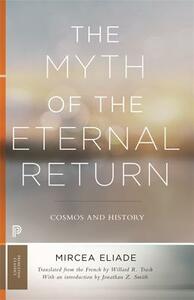Take a photo of a barcode or cover
Essential. One of those books that affect how you frame further readings not just in mythology but philosophy and classic literature as well (War and Peace anyone?).
I read this back in uni and it opened my mind a lot about structures of the world. Such a great read
I'm glad I read this right after "The Sacred and the Profane." The repetition of ideas helped me to understand both books better than if I had only read one of them. That said, this is still quite dry and academic in parts--a lot of ten-dollar words and phrases that take time to parse and unpack. I probably missed several of his points in both books, but I think I have a better grasp of the basic concepts he's trying to describe. Not sure I agree with all of them, but they are interesting.
Es terrible la racha que llevo de "libros interesantes que sin embargo podrían haberse resumido en 2 o 3 páginas y todo habría sido mucho más llevadero", la verdad.
I hated this book. It was short and I decided to give it my time, but it suffers awfully from three glaring flaws
1. The abhorrent, Jungian-type analysis is essentially an axiom of this text. Lathered with nonsense about how “Plants are only regarded as healing due to them having been referenced as benefitting gods/heroes of the past”, which entail an exhausting number of “It’s clearly A, because it’s A” statements that read like a Jordan Peterson speech
2. It wants to generalize everything; cultures, mythologies, etc. I understand this was in vogue for ethnographies and psychology of the era; how it became so is a mystery.
3. It states it’s thesis on page 1, and then repeats it two or three times every single page all the way through. There is little meaningful diversity of example, and when there are new examples they seem contrived.
I gained nothing from this at all
1. The abhorrent, Jungian-type analysis is essentially an axiom of this text. Lathered with nonsense about how “Plants are only regarded as healing due to them having been referenced as benefitting gods/heroes of the past”, which entail an exhausting number of “It’s clearly A, because it’s A” statements that read like a Jordan Peterson speech
2. It wants to generalize everything; cultures, mythologies, etc. I understand this was in vogue for ethnographies and psychology of the era; how it became so is a mystery.
3. It states it’s thesis on page 1, and then repeats it two or three times every single page all the way through. There is little meaningful diversity of example, and when there are new examples they seem contrived.
I gained nothing from this at all
"Among countless stones, one stone becomes sacred - and hence instantly becomes saturated with being . . . because it commemorates a mythical act . . ." --Eliade, p. 4
challenging
informative
reflective
slow-paced
challenging
informative
reflective
medium-paced
Intriguing study of the cyclical nature of myth and history in ancient cultures. A good companion for Campbell, and unlike Fraser, it's short! (I prefer a small digestible idea to large, chewy ones)
The first few chapters of this were assigned for class. I thought since I was already halfway through I might push through the rest, but I was already skimming a lot and not really getting anything out of the text. It isn't super engrossing without the context of what Eliade is referencing all the time.





